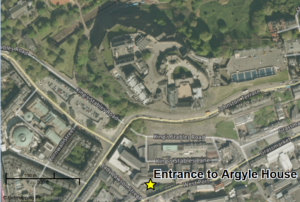For four weeks in July and August 2018, I did an internship in the Research Data Support (RDS) of the University of Edinburgh’s Information Services (IS). Otherwise, I am working as a librarian trainee in Bern University Library in Switzerland. There, as well as in other parts of Europe, research data is an issue which constantly gains momentum, and libraries are, among others, at the forefront of the changing scene. IS has a very good reputation for their work in this field, and so, as a librarian to be, the internship in the RDS was an outstanding opportunity for me to get first hand insights and experiences.
The project I was working on was about tailoring guidance for researchers writing their Data Management Plans (DMP) with the tool dmponline. As a basis for this, I had to gather information about the practices and needs of academic and support staff around research data management (RDM) and DMP. I was to work with staff from all three colleges. (In fact, I found that my project had quite some similarities to Clarissa’s who was just finishing her project when I joined the team.)
My first step was to get in touch with the school support staff, which was essential to get an overall impression of how RDM worked in each school, and to arrange my contacts with researchers. From this, along with information gathered from each schools’ websites, I created an interview questionnaire as well as an online survey. These served to capture researchers’ and support staff’s experience with RDM. For me, conducting interviews was a new and valuable experience. I gained confidence, and I was inspired by the staff’s willingness to share their experience with RDM. I think that interviewing is a very useful skill to develop, because finding out what school staff think and what they need is important in almost every sector of library work.
From the interviews and surveys, I also learnt a lot about researchers’ different practices and challenges in the context of research data management. I analysed the responses and documented my findings in reports for IS and school support staff. Unfortunately, my internship was too short for me to complete the tailored guidance part of the project, but I hope that my work will serve as a basis for the teams’ endeavours to further adapt their DMP support.
Summing everything up, my internship was an inspiring experience which was at times intense but also hugely enriching. This was due in large part to the fantastic team who were welcoming and supported me most effectively whenever needed (this is true, too, for my contact persons in the schools). I would have loved to learn even more about their various experiences, but, after all, I am really grateful for the opportunity I have been given to participate in their work and to learn so much about RDM.
Gero Schreier
Research Data Service Project Assistant
Librarian in training, University Library, University of Bern (Switzerland)

 Jennifer Daub has worked in a range of research roles, from lab-based parasite genomics at the University of Edinburgh to bioinformatics at the Wellcome Trust Sanger Institute. Prior to joining the team, Jennifer provided data management support to users of clinical trials management software across the UK and is experienced managing sensitive data.
Jennifer Daub has worked in a range of research roles, from lab-based parasite genomics at the University of Edinburgh to bioinformatics at the Wellcome Trust Sanger Institute. Prior to joining the team, Jennifer provided data management support to users of clinical trials management software across the UK and is experienced managing sensitive data. Catherine Clarissa is doing her PhD in Nursing Studies at the University of Edinburgh. Her study is looking at patients’ and staff experiences of early mobilisation during the course of mechanical ventilation in an Intensive Care Unit. She has good knowledge of good practice in Research Data Management that has been expanded by taking training from the University and by developing a Data Management Plan for her own research.
Catherine Clarissa is doing her PhD in Nursing Studies at the University of Edinburgh. Her study is looking at patients’ and staff experiences of early mobilisation during the course of mechanical ventilation in an Intensive Care Unit. She has good knowledge of good practice in Research Data Management that has been expanded by taking training from the University and by developing a Data Management Plan for her own research.
